|
|
|
Sort Order |
|
|
|
Items / Page
|
|
|
|
|
|
|
| Srl | Item |
| 1 |
ID:
132324
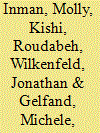

|
|
|
|
|
| Publication |
2014.
|
| Summary/Abstract |
In order to assess the impact of culture on state behavior in international crises, specifically with regard to mediation and its outcome, this study tests hypotheses rooted in both the international relations and the cross-cultural psychology literatures, implementing analysis at both the international-system level and the domestic-state-actor level. At the international system level, the study finds that cultural difference between adversaries affects whether or not mediation occurs during an international crisis but has no effect on tension reduction. At the domestic state actor level, we find that there are certain facets of cultural identity that make a state more or less open to requesting or accepting third-party mediation during an international crisis, but that these facets have no effect on tension reduction.
|
|
|
|
|
|
|
|
|
|
|
|
|
|
|
|
| 2 |
ID:
131810
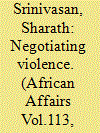

|
|
|
|
|
| Publication |
2014.
|
| Summary/Abstract |
A decade ago international peacemakers turned a blind eye when violence in Darfur, Sudan, first escalated into civil war. This article addresses the war's brutal beginnings, using a close reading of internal communications, interviews, and public statements to deepen our understanding of the predicament that key peacemakers found themselves in, and dug themselves into. For a long first year, when the majority of violent deaths in Darfur occurred, peacemakers employed a set of discursive strategies that intentionally depoliticized Darfur's conflict. Despite knowledge to the contrary, peacemakers carefully avoided connections between Darfur and the ongoing north-south peace negotiations they were championing to end Sudan's long second civil war. These ideational moves gave peacemakers a degree of cover for not responding directly to the conflict, but they also shaped the political calculations and opportunities of domestic actors in ways that further enabled armed violence, ultimately leading to policy failure. The problems of peacemaking in Sudan highlight the particular challenges that arise from negotiating peace. Negotiations give words a privileged place in taming the materiality of violence, yet this also leaves peacemakers liable to shaping new trajectories of political violence born out of local dissatisfaction with the prospects for peace.
|
|
|
|
|
|
|
|
|
|
|
|
|
|
|
|
| 3 |
ID:
132457
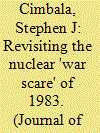

|
|
|
|
|
| Publication |
2014.
|
| Summary/Abstract |
Between 1979 and 1983, relations between the United States and NATO and the Soviet Union deteriorated gradually due to disagreements and controversies growing out of Cold War rivalry. Some Soviet leaders apparently convinced themselves that there was a nontrivial likelihood of a US or NATO nuclear first use or first strike in the near future, and Soviet intelligence agencies were tasked to anticipate it. A NATO exercise in the autumn of 1983 taking place in this hothouse atmosphere possibly lent itself to misperceptions of American and NATO intentions on account of its realism and some Soviet mind sets. The following discussion revisits the 1983 'war scare' episode by: (1)?reviewing high water marks in the political context leading up to the 1983 'war scare' situation; (2)?considering quantitative evidence on US and Soviet strategic nuclear force structures and possible operational performances; and (3)?deriving from this analysis certain conclusions about the 'war scare' of 1983 and its wider significance.
|
|
|
|
|
|
|
|
|
|
|
|
|
|
|
|
| 4 |
ID:
133682
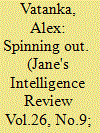

|
|
|
|
|
| Publication |
2014.
|
| Summary/Abstract |
With the new deadline for a final agreement on Iran's nuclear programme set for November 2014, interested parties gained four months to resolve their differences. Alex Vantanka examines the numerous pressures affecting a deal.
|
|
|
|
|
|
|
|
|
|
|
|
|
|
|
|
| 5 |
ID:
133699
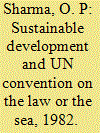

|
|
|
|
|
| Publication |
2014.
|
| Summary/Abstract |
United Nations Conference on Environment & Development (UNCED), Rio de Janeiro, 1992 In 1992, five years after the publication of the Brundtland Report, the United Nations Conference on Environment & Development (UNCED), known as the Earth Summit, took place in Rio de Janeiro, Brazil, between 3 and 14 June 1992. The Rio Summit brought together 182 world leaders - delegates from UN agencies and international organisations as well as world media and hundreds of Non- government organisations, to build upon the 1972 Stockholm conference and the 1987 Brundtland Report, and propelled sustainability on to the international stage. The Brundtland concept of sustainable development was universally endorsed at the 1992 United Nations Conference on Environment & Development (UNCED). The concept as elaborated by UNCED represents a new paradigm, a new mode of thinking to serve as a guide to action. Achieving sustainable development involves a process of decision- making in which certain questions are asked and appropriate choices and decisions made. Thus, there is never an end-state of sustainable development but a process that constantly tries to harmonise the needs of development with the maintenance of integrity of the Third United Nations Conference on the Law of the Sea for all the Sessions of the Conference between 1975 and 1982.
|
|
|
|
|
|
|
|
|
|
|
|
|
|
|
|
| 6 |
ID:
132013
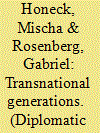

|
|
|
|
|
| Publication |
2014.
|
| Summary/Abstract |
The Cold War had just turned hot on the Korean Peninsula in late June 1950 when Deon Smith, a young Boy Scout from Mt. Vernon, Illinois, pitched his tent in Valley Forge. Fears of a global cataclysm loomed over the Revolutionary War battlefield, where nearly 50,000 Boy Scouts from the United States and twenty allied nations had gathered to celebrate Independence Day. Their jamboree marked the biggest encampment of youth on American soil to date, big enough to garner an address by President Harry Truman. "I hope that you young men … will take home from this jamboree a clearer understanding of the meaning of human brotherhood," said Truman. "I hope that you will work for freedom and peace with the same burning faith that inspired the men of George Washington's Army here at Valley Forge."1 Given the geopolitical context, the subtext was clear: "freedom and peace" required the "burning faith" of fighting men. Irony, as well as faith, burned in Truman's comments. Beyond the rhetoric of global brotherhood, Truman's internationalist overtures obscured particular national geopolitical interests on the peninsula and cast communism as an inhuman menace. Meanwhile, even as the grand statesman rallied the crowd, Deon Smith was busy forging international ties of his own-ties that did not grow out of security concerns but were driven by juvenile excitement and curiosity. He took part in various "Scoutcraft events" and "inter-camp visits," traded souvenirs with his distant peers, and formed friendships with Scouts from near and far. "Some of the most interesting groups we have met," Smith wrote, "are the Scouts from foreign lands," including boys from the former enemy nations of Germany and Japan. In this, Smith explored internationalism rather than merely assuming it. Who, then, assembled universal brotherhood more decisively at this jamboree: the president, whose speech recoded the chaos, flux, and pleasures of a sprawling encampment in the overdetermined, ironically nationalist registers of liberal internationalism, or the boy, whose handshakes gave literal flesh to Truman's rhetoric?2
|
|
|
|
|
|
|
|
|
|
|
|
|
|
|
|
| 7 |
ID:
132088
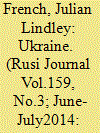

|
|
|
|
|
| Publication |
2014.
|
| Summary/Abstract |
As NATO prepares for the Wales Summit in September, the crisis in Ukraine and the resultant tensions with Russia have changed the geostrategic context in which the Alliance operates. Julian Lindley-French steps into the Russian mindset to analyse the motivations behind the country's assertive behaviour, and argues that it is vital that the West does the same.
|
|
|
|
|
|
|
|
|
|
|
|
|
|
|
|
|
|
|
|
|